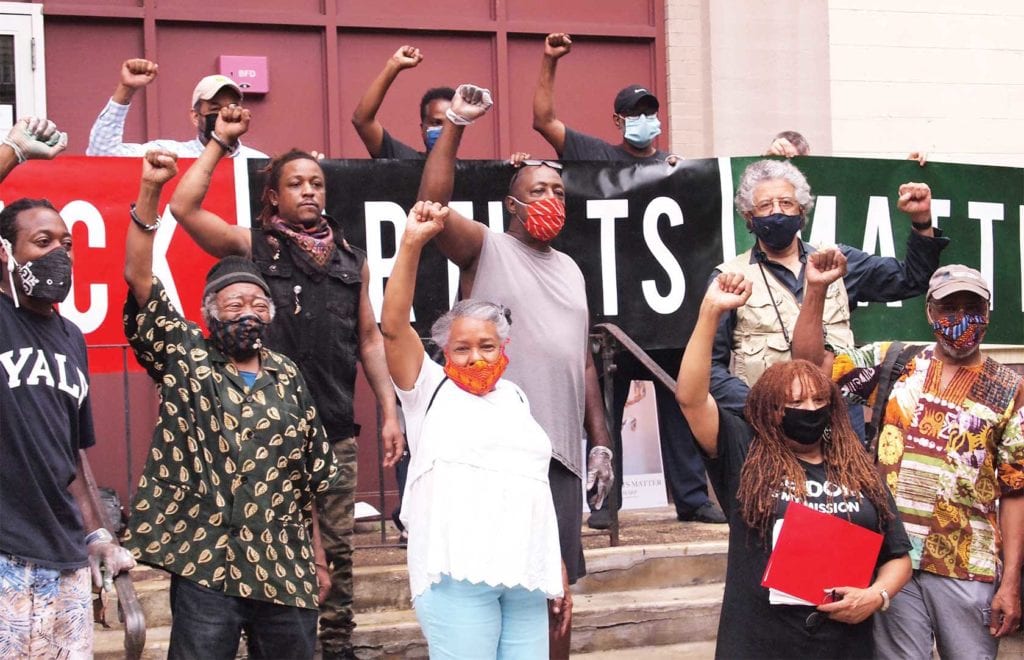Black artists locked out of NU studio space
Northeastern closed its doors on March 17. All buildings were locked as students were sent home

Several artists from the African American Master Artists in Residence Program (AAMARP) gathered in front of a Northeastern University studio space chanting “Give us the keys” on Saturday, as university officials stood inside and watched. Northeastern closed its doors on March 17. All buildings were locked as students were sent home. But AAMARP artists say they were given no prior notice when they lost access to their materials and art due to new locks on the doors.
On Friday, after sending out a press release about the upcoming protest, the artists were notified that they could contact Northeastern security and schedule a 30-minute time slot to be escorted into the studio and collect their things.
The AAMARP program began in 1973, started by Boston artist Dana Chandler, whose son Dana Chandler Jr. helped organize the June 27 protest. AAMARP exists as a three-year residency with chances for renewal, where artists can work on and display their art on the fourth and fifth floors of the 40,000-square-foot building, rent-free. Its affiliation with the University has been debated since 2018, when the locks were first changed.
AAMARP artist L’Merchie Frazier, director of education and interpretation at the Museum of African American History in Boston, recalls the city of Boston stepping in as a mediator in August of 2018, after the university declared the building “unsafe” for the artists but not others who work in the building.
“Our negotiations became null and void,” Frazier told the Banner. She found out the building was locked again in the beginning of June 2019 “without any prior notice or communication,” she said.
In a statement to the Banner, Ralph Martin, general counsel at Northeastern, said, “The University’s warehouse at 76 Atherton Street was treated the same as all other University buildings … Only essential employees, including researchers, have been given key card access to campus buildings.”
In September of 2019, artists were scheduled to move to an alternative space, Martin said, but due to the effects of the pandemic, that was extended to the end of the 2020 calendar year.
“The artists have been occupying space rent-free at Northeastern for more than three decades, largely without any connection to the University,” he wrote.
Frazier says “free space” is a misstatement, given that Northeastern has budgeted for this building for three decades. She and Chandler also mentioned Northeastern President Joseph Aoun’s six-page open letter on anti-black discrimination as a response to the George Floyd protests.
“They say one thing, and then they do another … Our property is in the building, my father’s legacy, my aunts’ and uncles’ legacy are in the building,” Chandler said.
Susan Thompson, a textile artist with AAMARP, said the program is more affiliated with the community than the university.
“We’re really entrenched with this community. And that was our mission. So 40 years ago when this program was established, it was with the understanding that artists were a resource for the community. So all of a sudden, they felt, ‘Why should we support this program right now?’” Thompson said.
Frazier, Chandler and AAMARP artist Gloretta Baynes have reached out to Northeastern for further negotiations beyond those that began in 2018, demanding to maintain the name and the space to operate. As of June 29, they have not heard a response, and they will not disclose their financial or official relationship with the University until they can have that meeting.
“We are grateful to the artists — and all in the Northeastern community — for adhering to public health guidance and moving to remote work,” Martin’s statement said. He did not comment on the meeting request.






